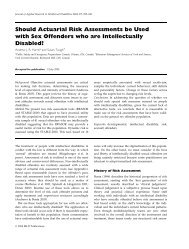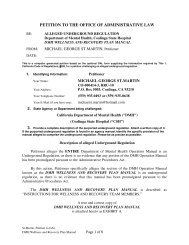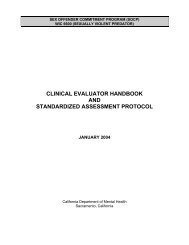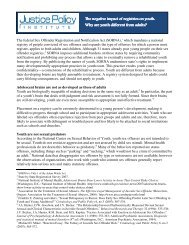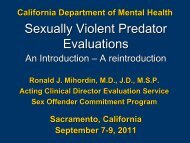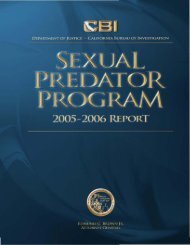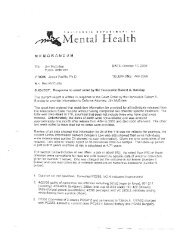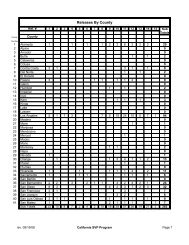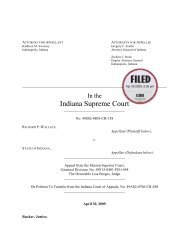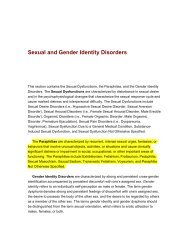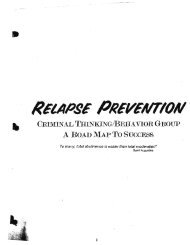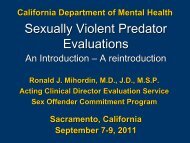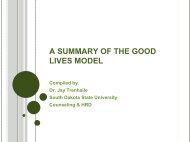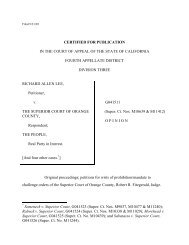Therapeutic Jurisp & Sexual Predator Laws - Defense for SVP
Therapeutic Jurisp & Sexual Predator Laws - Defense for SVP
Therapeutic Jurisp & Sexual Predator Laws - Defense for SVP
Create successful ePaper yourself
Turn your PDF publications into a flip-book with our unique Google optimized e-Paper software.
commitment. See Wash. Rev. Code Ann. §§ 71.05-.050 (West 1992 & Supp. 1999). Under Wash.Rev. Code Ann.§ 71.09.090(2) (West Supp. 1999), the sexual predator law, the resident may petition to the court<strong>for</strong> release even if the staff does not support his petition. However, a judge must find probablecause exists to believe his "mental abnormality or personality disorder has so changed that theperson is not likely to engage in predatory acts of sexual violence if conditionally released to a lessrestrictive alternative or unconditionally discharged..." be<strong>for</strong>e the court shall set a hearing on theissue. Without this finding of probable cause, the person is not entitled to a trial of this issue.Wash. Rev. Code Ann. § 71.09.090(2) (West Supp. 1999). Thus, it is structurally much moredifficult to obtain release under the Washington predator law than it is under the state's generalcivil commitment statute.n144 See Wash. Rev. Code Ann. § 71.09.070 (West 1992 & Supp. 1999).n145 See Wash. Rev. Code Ann. § 71.09.090(1) (West Supp. 1999).n146 See id.n147 See id.n148 See Wash. Rev. Code Ann. §§ 71.05.010-940 (West 1992 & Supp. 1999).n149 See Wash. Rev. Code Ann. § 71.09.090 (West 1992 & Supp. 1999).n150 See Wash. Rev. Code Ann. § 71.09.090(1) (West 1992 & Supp. 1999).n151 See id.n152 Prior to February 23, 1999, the prosecution had previously agreed to one less restrictiveplacement, which involved a juvenile sex offender currently, confined in an out-of-stateinstitution. In essence the government agreed that the offender could remain confined there andthat this would constitute a less restrictive placement under the law. As of that date, it alsoappeared that the SCC staff would recommend that a predator currently committed to the SCC beplaced in a less restrictive community placement. If the SCC staff did so, it will be the first time.Jackson Interview, supra note 37. In her Thirteenth Report the Special Master wrote:"Un<strong>for</strong>tunately, there are still no residents who have been recommended <strong>for</strong> a less restrictivesetting, or even <strong>for</strong> transitional programming (attending community treatment groups.)" ThirteenthReport, supra note 82, at 7. It is quite likely that the SCC may support a less restrictive placementat this time to demonstrate to Judge Dwyer that release is possible from the SCC. As of May 4,1999, five individuals have been placed in less restrictive community placements in WashingtonState. No individual has been released outright either from the SCC or from a community LRA.Telephone communication with Chris Jackson, Office of the Public Defender, Seattle, Washington(May 4, 1999).n153 Jackson Interview, supra note 37.n154 See supra note 40 and accompanying text.



